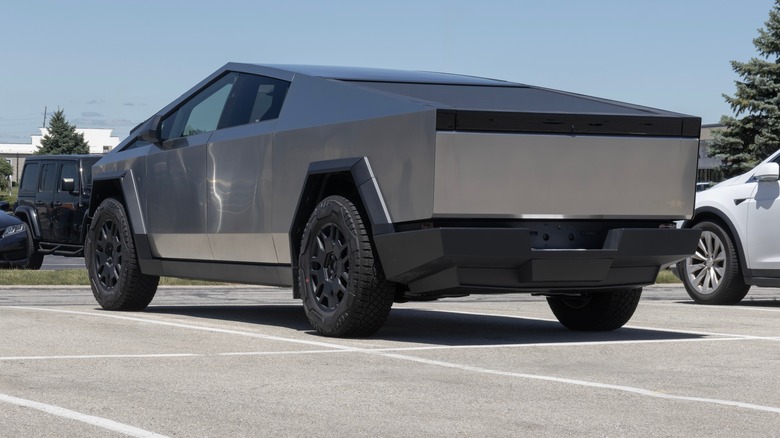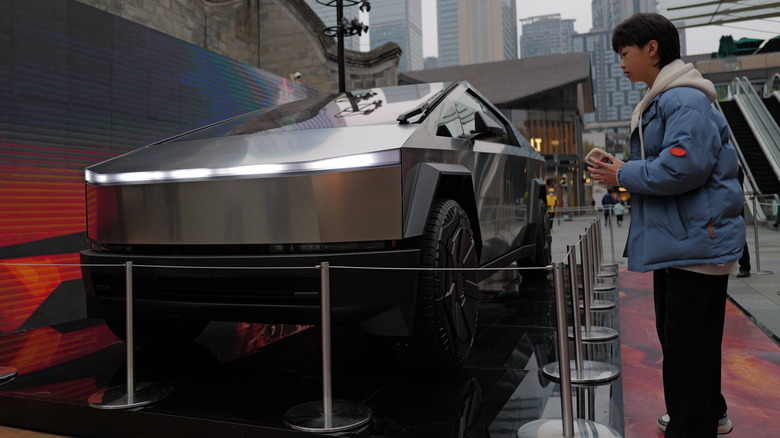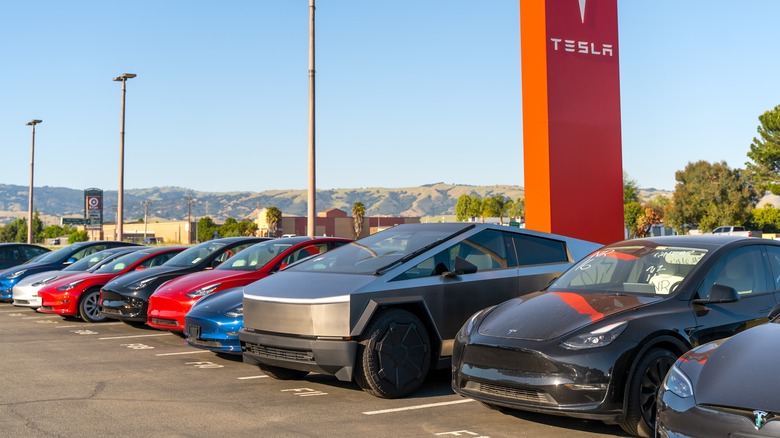The Tesla Vehicle Owners Allegedly Can't Trade In
Tesla's Cybertruck was loaded with futuristic designs when it first came out in 2019. But lately, it's hit some bumps in the road. Even though the truck had nearly 2 million pre-orders at debut, Tesla has stopped allowing owners to trade their old Cybertrucks for new models. This decision is raising some concerns, especially since Tesla had promised easy upgrades. On top of this, Tesla has a big problem; it has $200 million worth of Cybertrucks that nobody has bought yet just sitting around in lots all over the United States, as reported by Electrek.
Although the Cybertruck got a lot of attention when it was first announced, fewer people want it now because of its unusual design and the original long wait to get one. Adding to Tesla's challenges, Elon Musk has been making headlines for all the wrong reasons — his controversial comments about issues including stating that Social Security is experiencing billion-dollar levels of fraud (which turned out to be false), and legal troubles have turned off some of his longtime fans.
As people lose trust in Musk, Tesla's reputation has also taken a hit, with a 15% drop in brand trust over the last year, and at the moment, Tesla isn't Musk's most valuable asset anymore. Tesla Cybertruck owners are feeling the pains from the decision to stop accepting trade-ins. This policy change is particularly tricky because Tesla sells directly to consumers, bypassing traditional dealerships. This means owners can't just go to a local dealer to sell or trade their Cybertrucks.
Impact of non-trade-in policy
Now, some owners are turning to state Lemon Laws to return their trucks due to ongoing issues. "Lemon laws" protect you from faulty products, like cars that don't meet quality and performance expectations even after several repairs. These laws are a way to get a refund or replacement if a product consistently fails. Depending on the state, these laws could allow Tesla Cybertruck owners to return their faulty trucks and get a refund or a new vehicle. It is a tactic gaining traction, especially in California and Texas.
Also, Cybertrucks are depreciating by 40%, a stark contrast to the 20% to 35% seen with Tesla's Model Y, according to data from used electric vehicle markets. After three years, the Cybertruck's resale value is approximately $56,608. By five years, this depreciation increases to 59.5%, resulting in a resale value of around $40,492.
Adding to the challenge, Tesla doesn't offer a certified pre-owned program for the Cybertruck, which means owners can't get the higher resale prices that Model S sellers enjoy. Meanwhile, competitors like GM are drawing in customers with trade-in deals for the Silverado EV, putting Tesla at a disadvantage. This drop in value can start a cycle where low resale prices turn away potential buyers, reducing demand for both new and used models. While Tesla hopes software updates might make the Cybertruck more appealing, owners are looking for real, solid fixes to ensure these vehicles hold their value.
Impact on Tesla's future models
The brand, once celebrated for innovation, is seeing its reputation tarnish. Protests called "Tesla Takedown"— including vandalism at showrooms and social media campaigns calling for boycotts — have increased following CEO Elon Musk's controversial political comments. This discontent has led to a significant 12.9% drop in Tesla's global shipments as people's dissatisfaction with Musk impacts the brand and are raising concerns about Tesla's upcoming launches like the $25,000 compact EV planned for 2026.
Investors are nervous. Tesla's stock has fallen behind the S&P 500 by 45% in 2025, as doubts grow about its ability to stay on top while competitors like BYD and Hyundai introduce cheaper, more dependable electric vehicles (EVs). Tesla's customer loyalty is steady 67.8% in 2024, per S&P Global Mobility data, with a minor 1% dip. For a brand that used to rely heavily on its enthusiastic fans for pre-orders, this decline could affect demand for new models like the Semi or Roadster 2.0.
To turn things around, Tesla might need to fire Elon Musk and focus more on its engineering strengths rather than executive drama. Leaked documents hint at plans to enhance AI customer service tools and grow its Supercharger network into less served areas, aiming to improve support availability. There are also talks of partnerships with rental agencies like Hertz to help manage excess Cybertruck stock, which could help maintain its value, although this is still uncertain given recent reports about Hertz reducing its inventory.


